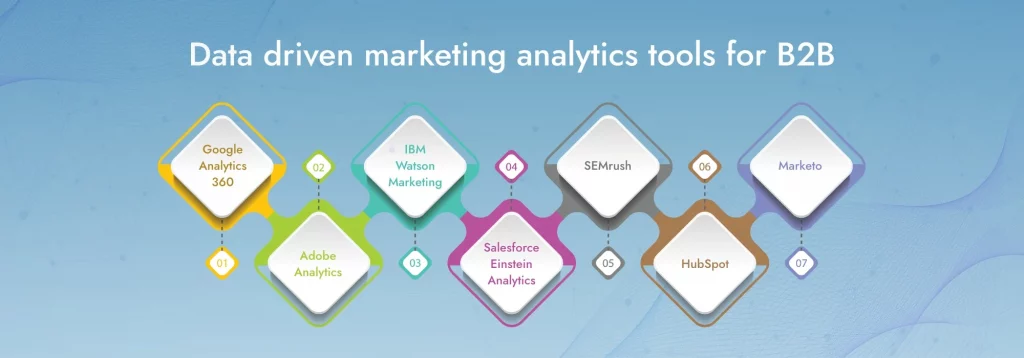Machine Learning and AI for revolution of Tech Companies are changing and streamlining businesses.
In this era of ever-increasing business competition, having a firm grip on B2B data strategies, leveraging B2B marketing analytics, and harnessing the power of AI is no longer an option, but a strategic imperative. Data-driven marketing for B2B businesses allows you to reach the right people with the right message at the right time.
If you’re not already using data to drive your B2B marketing, now is the time to start. By following the tips in this blog post, you can learn how to collect, organize, and analyze data to improve your marketing results.
Understanding data-driven marketing for b2b
In the realm of modern marketing, the phrase “data-driven marketing” has become a buzzword, and for good reason. It represents a fundamental shift in how businesses approach their marketing efforts, particularly in the B2B space.
Data-driven marketing, in its essence, is an approach that relies on the analysis of data and actionable insights to make informed decisions about marketing strategies and campaigns.
It’s about moving away from hunches and gut feelings and embracing a more precise and evidence-based methodology. For B2B enterprises, this means using data to understand their customers, identify market trends, and measure the impact of marketing efforts accurately.
B2b data strategies: driving success through precision
The first step to data-driven marketing for B2B is to collect and organize the right data. There are several ways to do this, including:
- Internal data: This includes data that you already have about your customers and prospects, such as CRM data, website analytics, and social media data.
- External data: This includes data that you can purchase from third-party providers, such as firmographic data, technographic data, and intent data.
Once you have collected your data, you need to clean it and organize it into a central database. This approach will make it easier to access and analyze your data.
Here are some effective B2B data strategies that can make a significant difference:
- Segmentation: Divide your target audience into distinct segments based on industry, company size, job roles, and past behavior to deliver right content
- Account-Based Marketing (ABM): Data-driven insights help identify the most promising accounts and craft personalized campaigns to engage them effectively.
- Lead Scoring: Data allows you to assign scores to leads based on their behavior, interactions, and demographic information.
- Content Personalization: Data-driven insights enable the creation of content that resonates with specific companies or roles within those companies.
- Predictive Analytics: B2B companies can use this strategy to anticipate customer needs and make proactive marketing decisions.
- Marketing Automation: Automating marketing processes through data-driven triggers and workflows to ensure a consistent and personalized customer experience.
Importance of clean and accurate data in b2b marketing
The success of any data-driven marketing strategy hinges on the quality of the data it relies upon. Inaccurate or incomplete data can lead to misguided decisions, wasted resources, and missed opportunities.
On the other hand, lean and accurate data helps ensure:
- Precision in Targeting
- Trust and Reputation
- Cost Efficiency
- Compliance and Legal Considerations
Role of AI in data-driven marketing
Artificial intelligence (AI) is revolutionizing data-driven marketing. AI can help businesses to collect, organize, and analyze data more efficiently and effectively than ever before. It can also be used to automate tasks, such as targeting and personalization, and to generate insights that would be difficult or impossible to obtain manually.
ViitorCloud harnesses the power of AI in data-driven marketing for unparalleled efficiency and insightful strategies. We can help you empower your marketing with our AI-driven solutions.
Here is how AI is being used in B2B data-driven marketing:
- Predictive analytics: It can be used to predict customer churn, lead conversion rates, and other important metrics. This information can be used to optimize marketing campaigns and to make better business decisions.
- Content personalization: It can be used to personalize content for individual customers and prospects. This includes things like product recommendations, blog posts, and email campaigns.
- Chatbots: AI-powered chatbots can be used to provide customer support and to engage with potential customers.
Here are key benefits of AI in data-driven marketing:
- Improved targeting and personalization: AI can help businesses to target their marketing campaigns more effectively and to deliver more personalized messages. This can ultimately lead to a boost in sales.
- Increased efficiency and productivity: It can automate a variety of marketing tasks, freeing up marketers to focus on more strategic initiatives.
- Better decision-making: It can provide insights into customer behavior and market trends that would be difficult or impossible to obtain manually. This information can be used to make better business decisions.
Data driven marketing analytics tools
There are a number of different data-driven marketing analytics tools that use AI to help businesses harness data. Some popular tools are:

- Google Analytics 360: This tool provides a comprehensive set of features for analyzing website traffic and customer behavior.
- Adobe Analytics: This tool provides a variety of features for analyzing website traffic, marketing campaigns, and customer behavior.
- IBM Watson Marketing: This AI-powered platform provides a variety of features for automating marketing tasks and generating insights into customer behavior.
- Salesforce Einstein Analytics: This analytics platform provides a variety of features for visualizing and analyzing CRM data.
- SEMrush: A comprehensive SEO and content marketing tool that provides insights into competitor data and helps improve content strategy.
- HubSpot: A comprehensive inbound marketing and sales platform offering analytics, CRM, and marketing automation, all in one.
- Marketo: A marketing automation platform that excels in lead management and personalized engagement.
Importance of utilizing the right tools
B2B data-driven success hinges on utilizing the right analytics tools and maintaining clean and accurate data. Selecting right tools help ensure:
- Precision in Analysis: Data-driven marketing analytics tools allow you to scrutinize campaign performance, customer behavior, and ROI, giving you an edge in optimization.
- Real-Time Insights: Many of these tools provide real-time data, ensuring that you can adapt your strategies on the fly to capitalize on emerging opportunities and address issues promptly.
- Personalization: Tools like customer relationship management (CRM) platforms and marketing automation software enable advanced personalization by leveraging data to tailor content and messages to specific segments.
- Data Integration: They often facilitate the integration of data from various sources, allowing you to create a unified view of your audience and marketing efforts.
Data-driven marketing agency: do you need one?
In the landscape of data-driven marketing, one critical decision businesses face is whether to manage their data strategies in-house or seek the expertise of a data-driven marketing agency.
Each choice has its own set of pros and cons, and determining which path to take depends on your specific needs and resources.
When to consider outsourcing data-driven marketing efforts
Considering whether to work with a data-driven marketing agency? Here are some situations in which outsourcing makes sense:
- Limited Resources: If you lack the budget and resources to maintain an in-house team and the necessary tools, an agency can be a cost-effective solution.
- Need for Expertise: When your business lacks expertise in data-driven marketing and you require immediate results, an agency’s specialized skills can bridge the gap.
- Scaling Quickly: If your business is rapidly expanding and you need to scale marketing efforts without a lengthy hiring process, an agency can step in seamlessly.
Wrap up
Staying ahead of the competition and achieving your marketing objectives requires a strategic approach grounded in data and analytics. Leverage data-driven marketing for B2B to understand your target audience, personalize your messages, and measure your results.
If you’re looking for a trusted data-driven marketing agency, ViitorCloud can help. We’re an AI-driven data analytics agency that can help your business harness the power of AI-enabled data analytics to improve their marketing results.
We offer a variety of services to help you with data-driven marketing, including data collection and organization, data analysis and reporting, AI-powered insights generation, and marketing campaign development and optimization. Let’s get started and turn your marketing goals into reality.
Frequently asked questions
It is an approach that uses insights from data analysis to optimize marketing strategies and campaigns for better targeting and results in the B2B context.
It works by collecting, analyzing, and leveraging data to make informed decisions, tailor content, and measure the impact of marketing efforts in B2B marketing.
Different types of data-driven marketing in B2B include content personalization, account-based marketing, predictive analytics, and lead scoring, each catering to specific goals and audience needs.
Some of the best tools for data-driven marketing in B2B are Google Analytics, HubSpot, Adobe Analytics, SEMrush, and Tableau, offering powerful insights and analytics capabilities.









